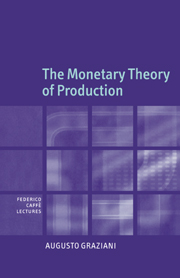Book contents
5 - The distribution of income
Published online by Cambridge University Press: 03 July 2009
Summary
Theories of income distribution
At least three different basic models of income formation and distribution can be distinguished.
The first is part of the more traditional neoclassical theory, based on autonomous choices of single agents. Negotiations in the labour market equalise for each individual the marginal utility of goods and the marginal disutility of labour. An equilibrium level of employment (number of employed and duration of work) is thus determined. The level of employment, coupled with the endowment of productive resources and available technologies, determines aggregate product and therefore, in a closed economy, national income. At the same time, once given the level of employment, the marginal product of labour is also determined, and therefore the level of real wages and the distribution of income between wages and profits. The preferences of consumers, within the constraints of factor endowments and technological knowledge, thus determine the general equilibrium of the whole economic system. As already noted, followers of the circulation approach reject the basic idea of consumer sovereignty in favour, as we shall presently see, of the opposite idea of producer sovereignty.
A second formulation is the one adopted by Keynes in his General Theory. Here national income is no longer determined by the individual choices of consumers but by the joint action of investment, decided by producers, on the one side, and of consumers' propensity to save through the multiplier mechanism on the other.
- Type
- Chapter
- Information
- The Monetary Theory of Production , pp. 96 - 113Publisher: Cambridge University PressPrint publication year: 2003



